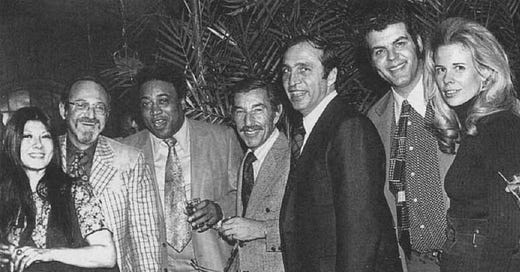MORRIS LEVY AND NATHAN ‘BIG NATE’ MCCALLA
Morris ‘Moishe’ Levy was the most famous reputed record business gangster of all-time. So notorious was Levy was the basis of the Hesh character in HBO’s epic gangster series The Sopranos. Starting with his ownership of the legendary Manhattan jazz club Birdland in the ‘40s, Levy accumulated labels, publishing companies, and retail outlets. His Roulette Records, founded in 1956, like many labels of the era, was notorious for abusive deals and ripping off artists. At one point Levy owned or controlled thirty thousand copyrights. By the ‘80s his fortune was estimated to be $75 million.
The most infamous example of Levy’s tactics was his treatment of Teenagers featuring the charismatic lead singer Frankie Lymon. In 1955 the group released the single “Why Do Fools Fall in Love,” which went to number one on the pop charts. The song was penned by Lymon, along with band-mates Herman Santiago and Jimmy Merchant. However only Levy’s name found his name on the single as co-writer with Lymon, generating hundreds of thousands of dollars for the label head. Levy was able to get away with this, and decades more shady deals, because he was reputedly the music businesses most important connection to the Mafia. The record man was close to the New York based Genovese crime family run by Vincent ‘the Chin’ Gigante and Dominick ‘Badly Dom’ Canterio.
Big Nate McCalla is the third from the left and Morris Levy the fifth.
Because of Levy’s involvement with R&B he needed a black emissary and he employed a quite fearsome one. His name was Nathan ‘Big Nate’ McCalla, a six-foot, 250 pound ex-Army vet who liked to brag that the U.S. government had trained him on how to kill. McCalla’s office was down the hall from Levy’s where Nate was on call when intimidation was required. The Levy-McCalla partnership appears to have begun when McCalla returned from Army service as a Korean War paratrooper. “If I was going to describe Nate, I’d recall the song ‘Bad, Bad Leroy Brown,’” an attorney told author Fred Dannen. “He had hands like baseball gloves.”
In 1965 McCalla was rewarded with his own Roulette distributed label, Calla, and a publishing company with an appropriate name JAMF (as in Jive Ass Mother Fucker.) McCalla may have been a thug, but he had good taste in music, signing the Emotions, Little Jerry Williams (aka Swamp Dogg) and Betty Lavette, all of whom would have success after exiting.
The bond between Levy and McCalla was way more than musical. In 1975 McCalla and Levy were indicted for attacking an off-duty police officer outside a Manhattan jazz club. NYPD cop Charlie Heinz made what Levy felt as an inappropriate comment to his girlfriend. According to the indictment McCalla held Heinz on the ground while Levy pummeled his face causing Heinz to lose his right eye. Despite this brutal act of violence, apparently a deal was worked out since the charges were dropped before the case went to trial.
In spring 1977, with the backing of Genovese family cash, Levy organized an Independence Day concert at the Take It Easy Ranch on Maryland’s Eastern Shore. Popular D.C. air personality Bob ‘Nighthawk’ Terry was brought in to co-promote and host the event. McCalla was sent down to Maryland to watch Levy’s on-site money. Apparently, Terry needed cash so bad that he decided to cross Levy. With the help of two D.C. hoods, Howard McNair and Teddy Brown, Terry printed up thousands of counterfeit tickets, pocketing money for sales Levy would never get paid for. McCalla was ordered to deal with this problem.
On July 2, two days before the concert, the bodies of McNair and Brown were found a few hundred yards from the ranch, each shot dead at close range. Despite this double murder the show went on. People backstage reported Terry and McCalla had a loud shouting match over how many people attended the show and the amount of cash taken in. Terry, who was implicated by local law enforcement in drug trafficking, didn’t back down from McCalla. On August 31 of ‘77 Terry drove off from WHUR radio station on the Howard University campus and was never seen again. A year later his Oldsmobile was found torched in a North Carolina field. His body was ever found.
Perhaps not coincidentally Calla Records shut down in 1977 with McCalla relocating to Florida. There was speculation McCalla was being sought by police, not just for his role in three murders, but to testify against Levy. On February 20, 1980 McCalla’s body was found at a Fort Lauderdale apartment. The backdoor was open. A set of keys were in the lock. The windows were all closed and the heat was on. McCalla was found sitting in front of his television in a lounge chair. The back of head blown off by gun fire. When his body was found McCalla had been dead a week. He was 49 years old at the time of his death.
Levy’s end wasn’t as violent. In 1990 he was convicted of extortion charges from an FBI investigation into mob infiltration of the music business. Levy received a ten-year sentence, but died of cancer two months before he was to report to prison. The record mogul was sixty-two years old.





they all got it in the end